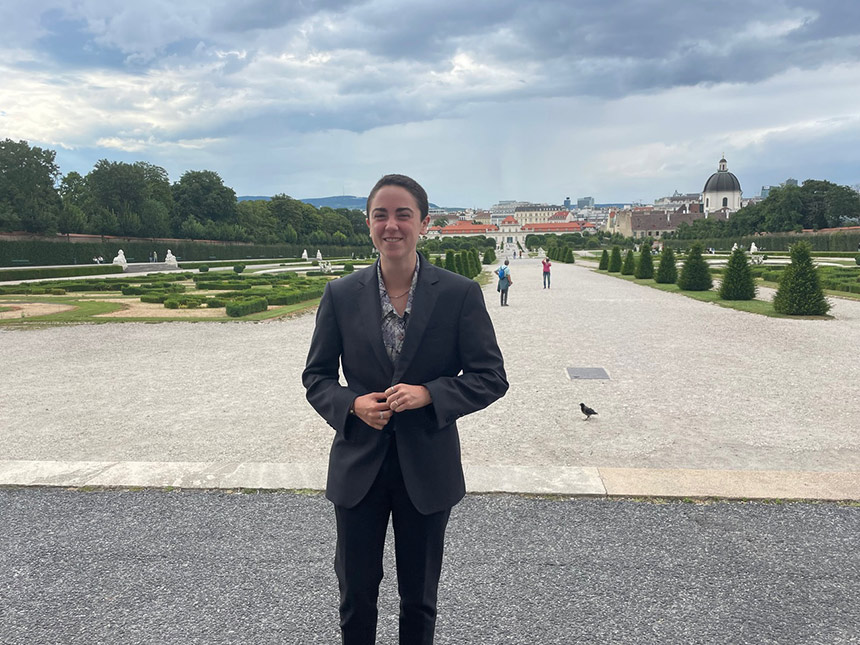
Our annual Student Summer Series presents first-person reflections from Berkeley Law students who are involved in an array of compelling summer work experiences. These snapshots of students’ career-enhancing work and skill development — across the legal spectrum — highlight the meaningful opportunities they gain, often in partnership with the school’s Career Development Office.
Bex Grayzel-Ward ’26 is no stranger to immigration work or Vienna. A 2021 University of Chicago graduate, they received a prestigious Fulbright grant to spend two years there helping refugees in schooling and housing settings. A poet, long-distance runner, and avid rock climber, Grayzel-Ward is a graduate student researcher for Berkeley Law’s Human Rights Center, working with a team that conducts qualitative research to understand best practices for LGBTQ+ youth in humanitarian settings globally. They were also a finalist in the school’s 1L Bales Trial Competition and have held internships in Mississippi, Chicago, Washington, D.C., and now Vienna.
Below, Grayzel-Ward unpacks their current summer work as a judicial extern for Judge Julia Ludwig at Austria’s Federal Administrative Court.
This summer, I am spending my time in a familiar city in an unfamiliar role. I came to law school to take the next step in pursuing international human rights work, and I am working as a judicial extern at the Bundesverwaltungsgericht, or Federal Administrative Court, in Austria.
I am working for Julia Ludwig, a judge on this court who handles asylum and data protection cases. These both have significant human rights implications enabling people to access their right to life through their ability to reside in a safe place or to maintain their privacy.
The Austrian legal system is very distinct from the one in the United States, and I am discovering new differences every day. A core distinction is that in Austria, judges remain fact-finders — even at the appellate level.

As a legal extern, I am able to assist with preparing materials before hearings. This means I get to do a lot of research not only concerning the state of the law, but also regarding the facts of the case, such as the current and potentially escalating situations of asylum seekers’ countries of origin due to contexts like war or natural disaster.
Before beginning law school, I spent two years in Vienna working with refugees in schooling and housing settings. Prior to coming to Vienna, I spent several years while an undergraduate working at a refugee resettlement agency in Chicago, assisting with their youth and family services division.
It is quite a stunning new experience to receive a file with someone’s entire application for asylum status. Suddenly, I am flipping through hundreds of pages of information about a person’s life, all the while feeling quite removed from the actual human’s experience. However, even amongst the dozens of forms, one still finds the pieces of humanity in each application, such as their hopes and ambitions if they are granted asylum status.
In the first asylum case I was able to witness, I did not anticipate entering a chamber with lime green doors. However, the rest of the proceeding was very formal, which one might expect from an Austrian hearing, including dark purple and black velvet robes. The hearing mainly consisted of the judge asking questions directly to the applicant, without objections or much real intervention from the applicant’s attorney.
Austria has an inquisitorial system in contrast to the adversarial system in the U.S. This means that while the Austrian attorney had opportunities to speak, the judge asked most of the questions directly to the applicant in an attempt to understand the facts as objectively as she could, rather than relying on attorney examinations of witnesses.
While the stark differences between the American and Austrian legal systems first garnered most of my attention, I have also begun to appreciate the similarities. For instance, both Austria and the U.S. are signatories to the 1967 Protocol Relating to the Status of Refugees, which defines legally the status of refugees. While the implementation and application of this definition varies because of the contrasting legal systems, the human rights framework and its aim to promote these rights is the same.
I am hopeful that I will take what I learn this summer and its valuable cross-cultural perspective into my future work. Given the current global conflict and the continued rise of climate refugees, gaining a deeper understanding of how asylum works in international practice is critical. My goal is to work in international human rights law in the future, so I am very grateful to have this amazing opportunity to gain a deeper understanding of how other legal systems work.
This experience has also helped me take a step back and critique the process of legal systems from an understanding that other systems exist. What method is really the best for seeking the truth and providing individuals with justice? While I continue to ruminate over this question, appreciating how different legal systems operate has deepened my understanding of the legal system as a dynamic instrument that has the potential to evolve to best serve specific contexts.